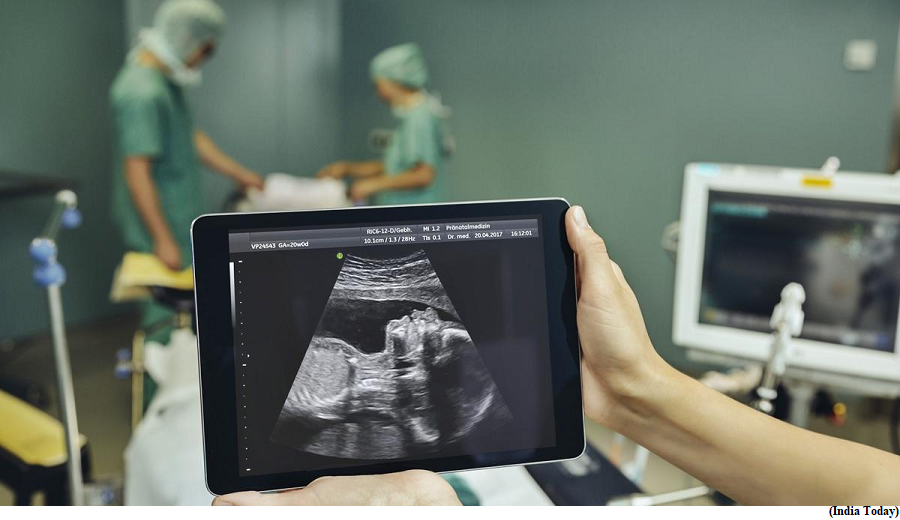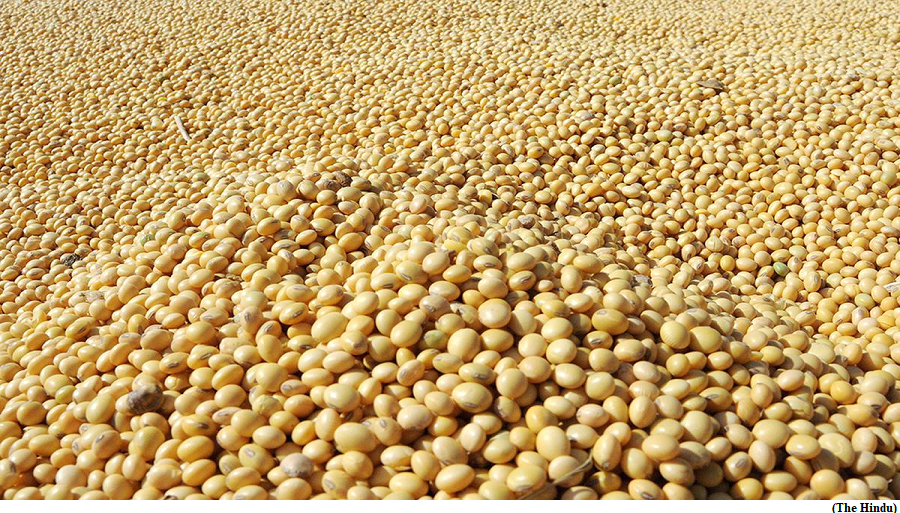Doctors perform first-of-its-kind brain surgery on unborn baby to treat rare disorder (GS Paper 2, Health)

Why in news?
- In what could be a game-changer in medical science, a team of doctors has performed brain surgery on an unborn baby in the fetus to treat a rare condition.
VOGM:
- Fetal surgery was performed to treat the condition known as Vein of Galen Malformation (VOGM).
- It is a type of rare blood vessel abnormality inside the brain, which, happens when arteries in the brain connect directly with veins, instead of connecting with capillaries, which help slow blood flow.
- The condition causes blood to rush toward the heart and lungs, forcing them to work overtime to get blood to the rest of the body.
- This can lead to congestive heart failure in some infants. Meanwhile, it could also lead to a jump in blood pressure in the arteries from the heart to the lungs.
In-utero surgery:
- The in-utero surgery was performed before the baby was born, guided by ultrasound procedures. The procedure resulted in the complete elimination of the expected aggressive postnatal natural history.
- The condition was found in an ultrasound when the fetus was 30 weeks old and doctors told the parents that the baby had an enlarged heart after which VOGM was diagnosed.
- The surgery was performed when the fetus was just over 34 weeks of gestational age.
Way Forward:
- This approach represents a paradigm shift in the management of this challenging condition, from a strategy focused on reversing severe multiorgan pathophysiology after onset to one focused instead on prevention.
China approves safety of first gene-edited crop
(GS Paper 3, Science and Technology)
Why in news?
- China has approved the safety of a gene-edited soybean, its first approval of the technology in a crop, as the country increasingly looks to science to boost food production.

Details:
- The soybean, developed by privately owned Shandong Shunfeng Biotechnology Co., Ltd, has two modified genes, significantly raising the level of healthy fat oleic acid in the plant.
- Unlike genetic modification, which introduces foreign genes into a plant, gene editing alters existing genes.
- The technology is considered to be less risky than GMOs and is more lightly regulated in some countries, including China, which published rules on gene-editing in 2022.
Upcoming crops:
- Shunfeng claims to be the first company in China seeking to commercialise gene-edited crops.
- It is currently researching around 20 other gene-edited crops, including higher yield rice, wheat and corn, herbicide-resistant rice and soybeans and vitamin C-rich lettuce, said a company representative.
Prospect in other nations:
- United States-based company Calyxt(CLXT.O) also developed a high oleic soybean, producing a healthy oil that was the first gene-edited food to be approved in the U.S. in 2019.
- Aside from the United States, Japan has also approved gene-edited foods, including healthier tomatoes and faster-growing fish.
Why it has been introduced?
- The approval comes as trade tensions, erratic weather and war in major grain exporter Ukraine have increased concerns in China over feeding the country's 1.4 billion people.
- A growing middle class is also facing a surge in diet-related disease.
Way Forward:
- China is promoting GMO crops too, starting large-scale trials of GM corn in 2023.
- Getting gene-edited crops onto the market is expected to be faster however, given fewer steps in the regulatory process.
India’s 1st Green Credit scheme to reward eco-friendly actions by individuals, industries
(GS Paper 3, Economy)
Why in news?
- After Union Finance Minister’s announcement in the 2023-24 Budget, the Ministry of Environment, Forest and Climate Change (MoEFCC) has readied the draft contours for rolling out India’s first Green Credit Programme (GCP).
- Aimed at incentivising voluntary environmental actions, the green credits will be tradable on a proposed domestic market platform.

Implementation:
- The MoEFCC has proposed that a steering committee headed by the environment secretary and comprising officials from concerned ministries or departments, domain experts and industry associations will govern the implementation of GCP.
Activities included:
- tree plantation;
- water conservation, water harvesting and water use efficiency/savings;
- promoting natural and regenerative agricultural practice;
- waste management;
- air pollution reduction;
- mangrove conservation and restoration;
- ecomark-based green credit; and
- construction of buildings and other infrastructure using sustainable technology and material.
- Individuals, private sectors, industries, farmer groups, forest enterprises, urban local bodies (ULB), zila and gram panchayats can earn green credit for undertaking these specified activities.
- In case of violation of the provisions contained in the notification, these entities will also have to pay environmental compensation.
How it will work?
- The GCP administrator will collect the environmental compensation and deposit it in a separate dedicated account.
- This fund shall be utilised for taking measures for market stabilisation along with other activities related to the implementation of GCP, as approved by the steering committee.
- There will be a monetary value put to each green credit.
- The green credits can be bought by environment-conscious companies or industries wanting to avail loan at a cheaper rate of interest for undertaking environment-friendly interventions. The trading platform will connect all players, who are suppliers of green credit.
- Thresholds and benchmarks will be developed for each green credit activity/process for generating and issuance of green credit.
- Allocation of one unit of GC in respect of each activity will be determined based on the environmental outcome achievable, equivalence of resource requirement, parity of scale, scope, size and other relevant parameters.
- The government will also develop and establish digital processes for the GCP, including self-assessment of eligible green credit activities, registration of projects, issuance of green credits and monitoring performance.
Role of steering committee:
- The steering committee will not only approve procedures for institutionalising the GCP, but also approve its rules and regulations and recommend to the central government for issuance of Green Credit Certificate.
- It will also determine the type and amount of fees and charges for the purpose of meeting the cost and expense towards implementation of GCP.
Administrator:
- The Indian Council of Forestry Research and Education (ICFRE) will be the administrator of GCP and will manage, monitor and operate the entire programme.
- It will register the green credits and maintain records of all transactions and ensure that trade happens with requisite discipline.
- The ICFRE will constitute technical or sectoral committees for each different activity to facilitate in developing methodologies and standards and processes for registration of GC projects and grant of GCs.
- ICFRE will also issue guidelines for the establishment of the trading platform for the exchange of green credit certificates with the approval of the steering committee.
Trading platform:
- The trading platform for the exchange of Green Credit Certificates shall be established by the Trading Service Provider accredited by the GCP administrator.




